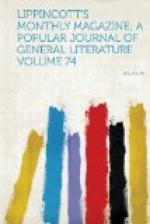The Watauga community had been till now living under no organized government. This worked very well so long as the newly-arriving immigrants were of the class which is “a law unto itself;” but when another class came in,—men fleeing from debt in the older settlements or hoping on the remote and inaccessible frontier to escape the penalty of their crimes,—some organization which should have the sanction of the whole body of settlers became necessary. Therefore, speaking in the language of Sevier, they, “by consent of the people, formed a court, taking the Virginia laws as a guide, as near as the situation of affairs would admit.”
The settlers met in convention at the fort, and selected thirteen of their number to draft articles of association for the management of the colony. From these thirteen, five (among whom were Sevier and Robertson) were chosen commissioners, and to them was given power to adjudicate upon all matters of controversy and to adopt and direct all measures having a bearing upon the peace, safety, good order, and well-being of the community. By them, in the language of the articles, “all things were to be settled.”
These articles of association were the first compact of civil government anywhere west of the Alleghanies. They were adopted in 1772, three years prior to the association formed for Kentucky “under the great elm-tree outside of the fort at Boonesboro.” The simple government thus established was sufficient to secure good order in the colony for several years following.
Now ensued four more years of uninterrupted peace and prosperity, during which the settlement increased greatly in numbers and extended its borders in all directions. The Indians, true to their pledges to Robertson, continued friendly, though suffering frequently from the depredations of lawless white men from the old settlements. These were reckless, desperate characters, who had fled from the order and law of established society to find freedom for unbridled license in the new community. Driven out by the Watauga settlers, they herded together in the wilderness, where they subsisted by hunting and fishing and preying upon the now peaceable Cherokees. They were an annoyance to both the peaceable white man and the red; but at length, when the Indians showed feelings of hostility, they became a barrier between the savages and the industrious cultivators of the soil, and thus unintentionally contributed to the well-being of the Watauga community.
No event materially affecting the interests of the colony occurred during the four years following Robertson’s visit to the Cherokees at Echota. The battles of Lexington and Concord had been fought, but the shot which was “heard round the world” did not echo till months afterward in that secluded hamlet on the Watauga. But when it did reverberate amid those old woods, every backwoodsman sprang to his feet and asked to be enrolled to rush to the rescue of his countrymen on the seaboard. His patriotism was not stimulated by British oppression, for he was beyond the reach of the “king’s minions.” He had no grievances to complain of, for he drank no tea, used no stamps, and never saw a tax-gatherer. It was the “glorious cause of liberty,” as Sevier expressed it, which called them all to arms to do battle for freedom and their countrymen.




